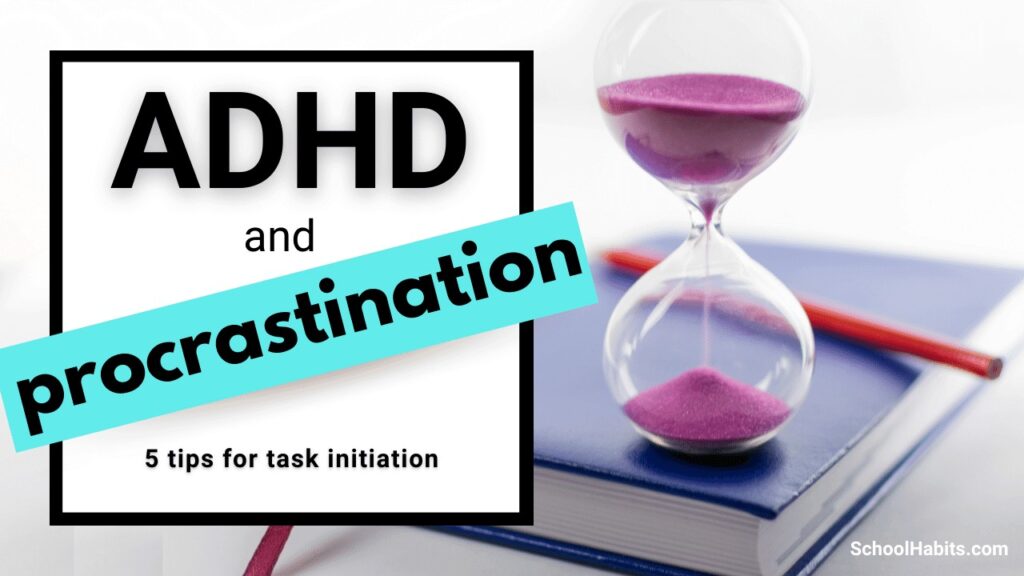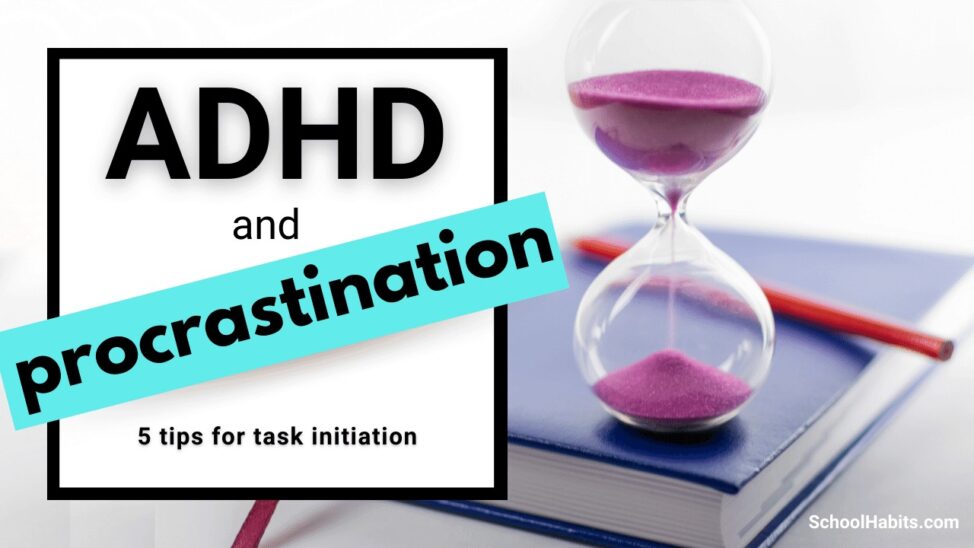By Katie Azevedo, M.Ed.
Procrastination is normal, everyone does it, and it essentially serves a fundamental purpose: to avoid pain. But procrastination is also a self-destructive behavior that can lead to troubled relationships, poor academic performance, low confidence, and anxiety.
ADHD and procrastination go hand-in-hand for a variety of reasons. Below are two primary connections between ADHD and procrastination.
1) Those with ADHD also have executive function weaknesses. Executive functions include a constellation of skills that center around self-management, including focus, planning, organization, and time management. It makes sense that someone who struggles to plan their tasks, manage their time, and organize their resources would frequently find themselves procrastinating. If you know or suspect you have weak executive function skills, you CAN improve them. That’s exactly why I created the Executive Function Journal – a 90-day journal that targets and builds key executive functions.
2) Those with ADHD have difficulty with emotional regulation (emotional dysregulation is a hallmark of ADHD). How we manage our emotions and moods around a task is directly related to our ability to get something done. This is also where the role of motivation comes in; emotional regulation influences motivation, which is another challenge for people with ADHD. If someone is in a negative or destructive emotional state (overwhelmed, anxious, feeling incapable, etc.), the end result is nearly always procrastination or total task avoidance.
PS: Have you heard of the most dangerous kind of procrastination? It’s the kind you don’t even know you’re doing.
ADHD and procrastination tips
The following procrastination tips for people with ADHD target the two primary issues detailed above. I have also created a 6-Part Procrastination Series full of more anti-procrastination tips that you should check out next. You can find those guides linked at the bottom of this post.
1. Rely on external systems and routines.
Internal self-regulation is a challenge for those with ADHD, a fact that emphasizes the importance of external systems. While many people with ADHD initially reject structure and routines, they are more important than nearly anything else. Even simple “rules” such as all homework begins at 4 PM every day or homework is done in the kitchen and studying is done in the living room can make a dent in one’s procrastination tendencies.
Tip: clocks and calendars are key players in external systems and routines, so use them frequently and consistently.
2. Add urgency and novelty to the task to increase motivation for doing it.
Novelty means newness, so you could change up the way you approach the task with new materials, a different environment, etc. Add urgency with timers, self-made deadlines, accountability partners, and consequences. Here’s an explanation of the connection between ADHD and motivation.
3. Do at least some of the task.
We sometimes procrastinate when we feel overwhelmed by the idea of doing the WHOLE thing. Instead of tackling a project all in one sitting (which I don’t suggest anyway), just begin with the very first step. Got an essay to write? Open and name a Google doc and write your theses on the top of the paper. Need to start studying for a test? Start by gathering all your materials. Have you been procrastinating on making your presentation for Spanish class? Create a Google Slides deck and start by just choosing your theme and making your title slide.
4. Don’t wait for motivation to strike.
Motivation is impermanent and unpredictable. We can’t wait to feel motivated before beginning something or we might just be waiting forever. “Know I need to do it but I just don’t feel like doing it” is the most common knee-jerk reaction I hear from chronic procrastinators, and my response is always the same: feeling like doing it is simply a bonus, but otherwise it’s mostly irrelevant to task initiation. I KNOW this response doesn’t sound cuddly, but please know that it comes from my genuine empathy for the ADHD struggle and my knowledge of cognitive skills.
5. Work alternatively on two tasks.
If you anticipate becoming bored or distracted while working on a challenging task, you’ll be more likely to procrastinate or avoid it completely. This goes back to what I wrote at the beginning of this post, which is that most procrastination stems from a desire to avoid pain. Essentially, task initiation won’t happen if pain is expected.
A strategy for people with ADHD would be to pick two compatible tasks to alternate on. The key is that the two tasks should not require the same level of cognitive effort; one should be challenging, like your English essay, while the other should be less challenging, such as writing out Spanish flashcards. Work for 20-30 minutes on one task, and then work for that same amount of time on the other. Alternate until each task is complete.
Summary: Procrastination and ADHD
ADHD is a developmental impairment that impacts the areas of the brain that control executive functions. Executive functions are the skills required to operate independently, which include planning, organization, managing time and initiating and completing tasks.
Those with ADHD struggle daily with the urge to procrastinate – it’s in their wiring! – but that doesn’t mean they are doomed to procrastinate forever. It simply means that their urge to do so is stronger. These procrastination tips are aimed at setting up the right external structures and mental frameworks for overcoming procrastination with ADHD. Also, the Executive Function Journal can help you build skills that reduce procrastination and other executive function deficits.
The 6-Part Anti-Procrastination Series
- Part 1: How to make a task less boring
- Part 2: How to make a task less frustrating
- Part 3: How to give a task more structure and clarity
- Part 4: How to do a task when you just don’t care
- Part 5: How to stop procrastinating: A complete overview guide
- Part 6: How to do hard things: 6 tips for completing difficult tasks


